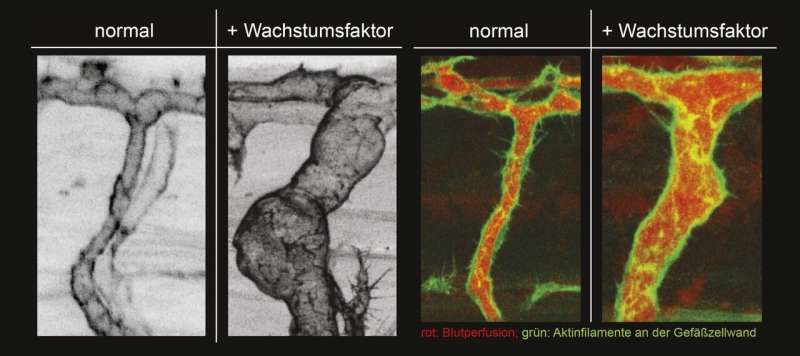Mechanism for specific and rapid expansion of blood vessels studied

Upon a heart infarct or stroke, rapid restoration of blood flow, and oxygen delivery to the hypo perfused regions is of eminent importance to prevent further damage to heart or brain. Arterial diameter is a critical determinant of blood flow conductance. Scientists of the Karlsruhe Institute of Technology (KIT) have now discovered a novel mechanism to structurally increase arterial diameter by selectively increasing the size of arterial endothelial cells, thereby allowing rapid increases in flow. The team has published their results in Nature Communications.
Research team leader Professor Ferdinand le Noble of the Department of Cell and Developmental Biology at the KIT explains that the prevalence of complex vascular disease is steadily rising and it is especially this patient population that will benefit from adjunct therapy to conventional revascularization methods. Unfortunately, many recent clinical therapeutic vascular growth trials failed, thus emphasizing the need for a more rational approach to this important area of clinical cardiovascular medicine, le Noble explains.
His research team now identified a novel mechanism to improve arteriogenesis involving enlargement of the endothelial cells lining the arteries. Larger endothelial cells allow a structural increase of arterial diameter in developing vascular networks. "This is important, as already small increases in arterial diameter considerably augment flow conductance, a simple physical principle," le Noble explains.
The process of cell enlargement is coordinated by a molecule called Trio. Trio is located inside the endothelial cell and plays a pivotal role in determining endothelial shape. Trio does this by selectively activating specific molecules, so called small Rho GTPases, that affect the structure and rigidity of the endothelial cytoskeleton in the cell periphery. The authors show that Trio can be activated selectively in developing arteries by precisely titrating Vegf signaling strength in the arterial wall. This is achieved by targeting soluble Vegf receptor Flt1, a decoy receptor for the growth factor VEGF. Endothelial cell enlargement is a fast process, independent of shear stress or inflammatory processes and within several hours results in 2-3 fold structurally larger arterioles that can attract flow to hypoperfused regions. Due to the rapid nature of this process, the authors believe that this approach has significant advantages over the (relatively slow) conventional angiogenesis approaches aimed at improving vessel number.
"We hope that our research can contribute to improving the treatment of ischemic cardiovascular diseases," le Noble says. "Our data derived from experimental models and human endothelial cells suggest that Trio is an interesting therapeutic target, and together with our collaboration partners, we envision to extend our work to pre-clinical models."
More information: Alina Klems et al. The GEF Trio controls endothelial cell size and arterial remodeling downstream of Vegf signaling in both zebrafish and cell models, Nature Communications (2020). DOI: 10.1038/s41467-020-19008-0




















